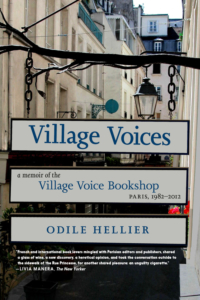
In the 26 years that she operated Village Voice books on the rue Princesse in Paris 6th arrondissement Odile Hellier earned a reputation for presenting the finest writers working in the English-language. (Sadly, she closed the shop and retired in 2012.) Her respect for their work, affection for America and indefatigable efforts to sustain her tiny, anachronistic, cultural outpost in a wilderness dominated by Amazon recall Sylvia Beach of the original Shakespeare & Co who toiled for little money to bring fresh English-language literary voices to Paris Anglophones in the twenties.
I had been a customer for over ten years and an occasional collaborator and it was with great pleasure that I collected her at her shop and walked down the street for a proper French lunch at Le Bistrot d’Henri where we settled in for a two-hour conversation about her life and career.
TG: Where were you born?
OH: In France, in the south, on the coast in Palavas des Flots near Montpelier but I haven’t been back since. My father was taken prisoner to Germany and escaped twice to join the resistance, first in the South and then to Brittany where he was killed in November 1944; 3 months before, his mother ( my grandmother) had been savagely killed as a resistant.
TG: When did you first come to Paris?
My sister was a student in Paris,. I was 12, 13, and 14 when she would invite me to Paris and take me to the opera and ballet since at the time I was training to be a dancer. Also, the years we lived in Nancy, our mother would take us to Brittany for the summer holidays. On the way, she would make a stop in Paris and for a few days , she would show us every place she loved. Wow-we had such a good time. So, Paris was certainly where I wanted to be.
After My Russian studies in Rennes, I moved to Paris for post-graduate studies that included a year in Moscow. Ironically, it is in Moscow where Russians students were passionately interested in the US that I decided to go there and discover America. I taught Russian for two years at High School .
After the invasion of Czechoslovakia by Russian troops I quit teaching Russian language.
This is when I decided to go to America. To be able to get to America I found a job as an au pair.
After a year, I came back to Paris to pursue my studies to qualify as translator. I was later offered a job in Washington D.C with a multinational company. I stayed with that company ten years .
The Seventies in America were an exciting cultural time. There were anti-war demonstrations, I was part of a feminist film project, I translated Saul Alinsky into French and got interested in Franz Fanon.
TG: You became a little bit “Red?”
OH: Almost. (A big laugh) Very Pink, I would say
TG: When did you open the store?
OH: I started working on my project in 1980 and I opened Village Voice in July of1982.
TG: Who are your favorite English-language writers-historical and contemporary? And those that most influenced you?
OH: This is a difficult question. Each time I am reading a book it is that book that counts. I came late to American literature but someone who had an impact on me was definitely Faulkner-the writing, the atmosphere, the depth, the guilt.
TG: What’s the greatest challenge facing you as the operator of an English-language bookstore in Paris?
OH: First of all, to keep calm… we and however small we may be, we still have a reputation and our visibility goes beyond the rue Princesse.
It’s not easy because as you know the business has radically changed. It’s not any longer the little bookshop that one could have in a nice area and care for the neighborhood and have decent conversations with customers. It’s not a gentlemen’s trade anymore-it’s cutthroat. And even though we are small and we are hidden away from the Grands Boulevards yet we are in the center of Paris but small we have a certain reputation so our visibility goes beyond the rue Princesse.
the biggest problem of course is the button you push on your computer or phone expecting the book within two days. It does not happen that way. It‘s pure fantasy.
But one of my preferred moments is the selection of books with the reps.
TG: What has been your proudest moment at Village Voice?
OH: I have strong memories of our author readings: Ginsberg in 1982 and Carver in 1987.
And Susan Sontag. I read all I could by her, it was wealth for me.
Two memories I particularly cherish: the evening with Cynthia Ozick in 1988 when this author recognized Nadine Gordimer in the audience, and publicly compared her to Anne Frank. Another one was also in 1988, the evening with Steven Spender and Mary McCarthy in the first row.
